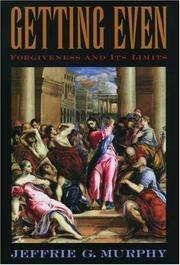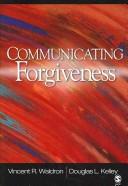| Listing 1 - 10 of 72 | << page >> |
Sort by
|

ISBN: 0195151496 9780195151497 Year: 2003 Publisher: Oxford: Oxford university press,
Abstract | Keywords | Export | Availability | Bookmark
 Loading...
Loading...Choose an application
- Reference Manager
- EndNote
- RefWorks (Direct export to RefWorks)
Forgiveness. --- Forgiveness --- Unforgiveness --- Conduct of life --- Absolution --- Amnesty --- Clemency --- Pardon
Book
ISBN: 1785920006 1784500062 9781784500061 9781849055666 1849055661 9781785920004 Year: 2015 Publisher: London, England ; Philadelphia, Pennsylvania : Jessica Kingsley Publishers,
Abstract | Keywords | Export | Availability | Bookmark
 Loading...
Loading...Choose an application
- Reference Manager
- EndNote
- RefWorks (Direct export to RefWorks)
Thought-provoking and powerful real life stories from survivors and perpetrators of crime and violence around the world are collected here from a diverse range of situations. They raise the possibility of alternatives to resentment, retaliation and revenge, with each story showing the very real impact of forgiveness within a particular context.
Forgiveness. --- Unforgiveness --- Conduct of life --- Absolution --- Amnesty --- Clemency --- Pardon
Book
ISBN: 1634833589 9781634833585 9781634833349 1634833341 Year: 2015 Publisher: New York : Nova Publishers,
Abstract | Keywords | Export | Availability | Bookmark
 Loading...
Loading...Choose an application
- Reference Manager
- EndNote
- RefWorks (Direct export to RefWorks)
Forgiveness. --- Unforgiveness --- Conduct of life --- Absolution --- Amnesty --- Clemency --- Pardon
Book
ISBN: 9781782411178 1782411178 1299599885 9781299599888 9781781812488 1781812489 0429899637 0429474865 9780429896946 0429913869 Year: 2013 Publisher: London : Karnac,
Abstract | Keywords | Export | Availability | Bookmark
 Loading...
Loading...Choose an application
- Reference Manager
- EndNote
- RefWorks (Direct export to RefWorks)
How can one overcome deeply-held resentment so as to resume or establish a bond with a traumatizing person, mindful that the experience of the self is rooted in the very intimate relationships from which such trauma arose? This book centres on the challenge of forgiveness and recovery from trauma in intimate relationships as viewed psychodynamically in the clinical context. Traumas inflicted by intimates, especially by parents, differ from transgressions and betrayals-however legitimately traumatizing-committed in less psychically-rooted relationships. While some betrayals are in fact not forgivable, what is at issue when parents or other intimates betray is the inevitable yearning for reunion: a wish whose potential fulfillment raises the spectre of re-traumatization and humiliation and is thus fraught with risk.
Forgiveness. --- Unforgiveness --- Conduct of life --- Absolution --- Amnesty --- Clemency --- Pardon
Book
ISBN: 303073174X 3030731731 Year: 2021 Publisher: Cham, Switzerland : Palgrave Macmillan,
Abstract | Keywords | Export | Availability | Bookmark
 Loading...
Loading...Choose an application
- Reference Manager
- EndNote
- RefWorks (Direct export to RefWorks)
Forgiveness. --- Unforgiveness --- Conduct of life --- Absolution --- Amnesty --- Clemency --- Pardon
Book
ISBN: 0810142805 0810142791 0810142783 Year: 2020 Publisher: Evanston, Illinois : Northwestern University Press,
Abstract | Keywords | Export | Availability | Bookmark
 Loading...
Loading...Choose an application
- Reference Manager
- EndNote
- RefWorks (Direct export to RefWorks)
In Original Forgiveness, Nicolas de Warren challenges the widespread assumption that forgiveness is always a response to something that has incited it. Rather than considering forgiveness exclusively in terms of an encounter between individuals or groups after injury, he argues that availability for the possibility of forgiveness represents an original forgiveness, an essential condition for the prospect of human relations. De Warren develops this notion of original forgiveness through a reflection on the indispensability of trust for human existence, as well as an examination of the refusal or unavailability to forgive in the aftermath of moral harms.De Warren engages in a critical discussion of philosophical figures, including Martin Heidegger, Hannah Arendt, Mikhail Bakhtin, Edmund Husserl, Gabriel Marcel, Emmanuel Levinas, and Jean Améry, and of literary works by William Shakespeare, Fyodor Dostoevsky, Heinrich von Kleist, Simon Wiesenthal, Herman Melville, and Maurice Sendak. He uses this discussion to show that in trusting another person, we must trust in ourselves to remain available to the possibility of forgiveness for those occasions when the other person betrays a trust, without thereby forgiving anything in advance. Original forgiveness is to remain the other person’s keeper—even when the other has caused harm. Likewise, being another’s keeper calls upon an original beseeching for forgiveness, given the inevitable possibility of blemish or betrayal.
Trust. --- Forgiveness. --- Unforgiveness --- Conduct of life --- Absolution --- Amnesty --- Clemency --- Pardon --- Trust (Psychology) --- Attitude (Psychology) --- Emotions

ISBN: 0415278554 0415278562 9780203870136 0203870131 9781135199104 1135199108 1283102293 9781283102292 9780415278553 9780415278560 9786613102294 9781135199050 9781135199098 1135199094 Year: 2002 Publisher: London ; New York : Routledge,
Abstract | Keywords | Export | Availability | Bookmark
 Loading...
Loading...Choose an application
- Reference Manager
- EndNote
- RefWorks (Direct export to RefWorks)
Forgiveness. --- Revenge. --- Vengeance --- Retribution --- Unforgiveness --- Conduct of life --- Absolution --- Amnesty --- Clemency --- Pardon

ISBN: 1282450921 9786612450921 1890151645 9781890151645 1599470047 9781599470047 1890151491 9781890151492 189015184X 9781890151843 Year: 2002 Publisher: Philadelphia : Templeton Foundation Press,
Abstract | Keywords | Export | Availability | Bookmark
 Loading...
Loading...Choose an application
- Reference Manager
- EndNote
- RefWorks (Direct export to RefWorks)
This book brings together a unique combination of experts in the area of conflict resolution and focuses on the role forgiveness can play in the process. It deals with the theology, public policy, psychological and social theory, and social policy implementation of forgiveness.The first section of the book explores how ideas like ""forgiveness"" and ""reconciliation"" are moving out from the seminary and academy into the world of public policy, and how these terms have been used and defined in the past. One of the contributors, Miroslav Volf, speaks to the Christian contribution of a more peac
Forgiveness. --- Forgiveness --- Reconciliation --- Unforgiveness --- Conduct of life --- Absolution --- Amnesty --- Clemency --- Pardon --- Religious aspects.

ISBN: 1322283710 1483329534 1452245622 9781452245621 9781452278797 1452278792 9781483329536 1412939712 1412939704 9781322283715 Year: 2008 Publisher: Los Angeles : SAGE,
Abstract | Keywords | Export | Availability | Bookmark
 Loading...
Loading...Choose an application
- Reference Manager
- EndNote
- RefWorks (Direct export to RefWorks)
'Communicating Forgiveness' provides a synthesis of the literature on forgiveness in relationships, with special emphasis on the central but understudied role of interpersonal communication.
Forgiveness. --- Interpersonal communication. --- Communication --- Interpersonal relations --- Unforgiveness --- Conduct of life --- Absolution --- Amnesty --- Clemency --- Pardon
Book
ISBN: 131748830X 1315710226 1280119977 9786613523914 1844654680 9781844654680 9781317488309 9781280119972 1844652262 9781844652266 1844652262 9781844652266 9781315710228 9781317488286 9781317488293 9781138149984 1317488296 Year: 2010 Publisher: Durham : Acumen,
Abstract | Keywords | Export | Availability | Bookmark
 Loading...
Loading...Choose an application
- Reference Manager
- EndNote
- RefWorks (Direct export to RefWorks)
Forgiveness usually gets a very good press in our culture: we are deluged with self-help books and television shows all delivering the same message, that forgiveness is good for everyone, and is always the right thing to do. But those who have suffered seriously at the hands of others often and rightly feel that this boosterism about forgiveness is glib and facile. Perhaps forgiveness is not always desirable, especially where the wrongdoing is terrible or the wrongdoer unrepentant. In this book, Garrard and McNaughton suggest that the whole debate suffers from a crippling lack of clarity about what forgiveness really amounts to. They argue that it is more difficult, complex and troubling than many of its advocates suppose. Nevertheless, they conclude, a proper understanding of forgiveness allows us to avoid cheap and shallow forms of it, and enables us to see why it is right and admirable to forgive even unrepentant wrongdoers.
Forgiveness --- Forgiveness. --- Unforgiveness --- Conduct of life --- Absolution --- Amnesty --- Clemency --- Pardon --- Psychological aspects. --- Social aspects.
| Listing 1 - 10 of 72 | << page >> |
Sort by
|

 Search
Search Feedback
Feedback About UniCat
About UniCat  Help
Help News
News